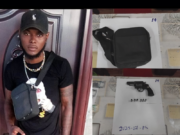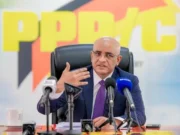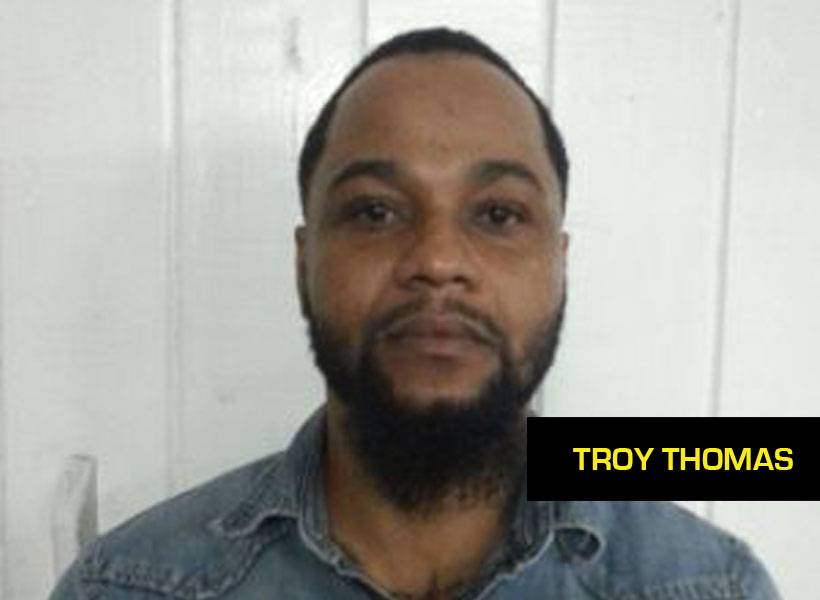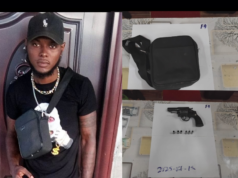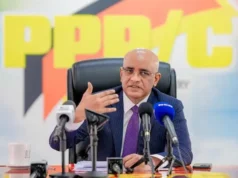High Court Judge Navindra Singh this morning ruled that there is sufficient evidence against the man police call Troy Thomas for him to be extradited to the United States where he is wanted on two criminal charges, including murder. Justice Singh also ordered Thomas to pay $450,000 in court costs.
The judge thereby dismissed an application by Thomas, a prisoner, in which he sought to challenge his “illegal” confinement. The judge ordered Thomas to pay $150,000 in court costs to each of the respondents in his application, namely, the Commissioner of Police, Director of Public Prosecutions, and the Attorney General, thereby coming to a total of $450,000.
According to the judge, his findings were based on the affidavit of one Kirt Kyte, who claims to be an eyewitness to Thomas shooting Keith Frank in the torso, inflicting injuries Dr. Katherine Maloney opined resulted in the death of Frank.
Keith Frank, 20, Guyanese, was shot and killed on December 11, 2011 outside a Richmond Hill, New York party, where he ran into some other men with whom he had an ongoing dispute.
It was reported that after the killing, Thomas, a Guyanese citizen, fled to Canada and then his homeland where he was captured in March 2018, at a house in Liliendaal, Greater Georgetown.
Following a hearing last year November, Principal Magistrate Sherdel Isaacs-Marcus ordered that Thomas be extradited to the US to face a charge for murder and two counts of criminal possession of a weapon, both in the second degree.
In committing Thomas for extradition, among other things, the Magistrate ruled that she believed the fugitive was Troy Thomas although he insisted that his name was Marvin Williams. In fact, in June 2012, a US judge issued a warrant for his arrest in the name Troy Thomas.
Justice Singh, too, said that he believed Williams and Thomas are the same person, thereby upholding an earlier ruling made by Justice Jo-Ann Barlow who, after perusing evidence, found that he was indeed Troy Thomas, a name he answered to multiple times in court.
Before Justice Singh, Thomas’ lawyer, Nigel Hughes, had argued that, among other things, his client is being unlawfully detained and subjected to legal process unsupported by any legal basis or foundation.
Last year, lawyers for Thomas had mounted a challenge against the Extradition Treaty between the United States of America and Guyana before Justice Barlow. On June 15, 2018, Justice Barlow ruled that the Magistrates’ Courts had jurisdiction to hear the extradition proceedings.
The Judge further ruled that there is an extradition treaty between the United States of America and Guyana. The judge had noted that the Extradition Act 1870 to 1935 and the 1931 Treaty were incorporated into domestic legislation in Guyana.
Further, Thomas had argued that the Minister of Public Security had no legal right to issue directives for the Magistrate to commence committal/extradition proceedings and for the Magistrate to conduct the proceedings, since they purported to act in accordance with Section 5 of the Fugitive Offenders Act, which is unconstitutional and in furtherance of a Treaty which is not incorporated into the Laws of Guyana.
The Judge, however, disagreed with this argument. As it is, Thomas has filed an appeal against the magistrate’ s extradition committal with the Court of Appeal in Kingston, Georgetown. That matter is pending.
